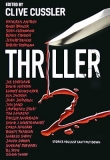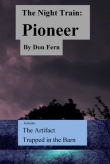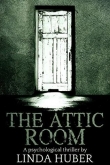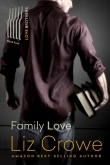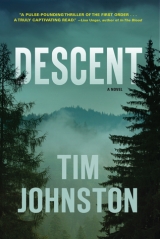
Текст книги "Descent"
Автор книги: Tim Johnston
Жанр:
Триллеры
сообщить о нарушении
Текущая страница: 20 (всего у книги 25 страниц)
55
After dinner the boy got into his jacket and went down the porch steps and out onto the April snowfall. He headed for the barn, stepping again and again into his own blue shadow, until abruptly he stopped and looked up and saw the full moon burning overhead. For all its wintry sharpness the night smelled of the thaw the snow had covered, of loam and grass and pitch. As he neared the barn he smelled the hay bale he’d busted open earlier, and he smelled the horses and the saddles, odors as pungent as they’d be on a hot day in the summer. The mares stretched their necks and snorted as he unpocketed an apple and held it out to be smacked up by one mare and then he did the same for the other. They snuffed up the apple scent from his palm and, finding only scent, permitted him to stroke the warm ridge of bone from forehead to muzzle. On the rail before the tack wall sat the two saddles, and he put his hand on the seat of one, feeling along the smooth cool curve of it.
He’d seen her just once, since: dark-haired and pretty in her black dress at the old man’s funeral . . . looking up to find her looking at him. But that was not the time to talk to her, that was not the time, and what did it matter anyway?
When he got back to the house, his father had broomed off the porch steps and was sitting on the top step, smoking a cigarette. The boy sat beside him and took one of his cigarettes and leaned toward the offered flame.
“You ever look at that old man’s throat?” his father said.
“Yeah, I looked at it.”
“But it made no impression.”
“It made an impression.” He drew on his cigarette. “I’ll quit when you quit.”
Grant looked at him and looked away. “All right.”
One of the mares whinnied and stamped in her stall.
“They’re going to miss you,” Grant said.
“Who?” said the boy. Flicking his ash.
“Those horses. Who did you think I meant?”
The boy shrugged. “Thought you meant the horses.”
“Then why’d you ask who?”
The boy said nothing. They smoked.
“Maybe we should make an offer,” Grant said. “Take them with us. The horses, I mean.”
“Take them where?”
Grant lifted his cigarette and drew on it. Across the blue clearing sat the old man’s house, dark and silent. There was no wind or movement or sound anywhere. The El Camino had been gone all day.
“You think he’s coming back?” said the boy.
Grant straightened his arm to tip his ash. “It doesn’t much matter now, does it?”
“It never did,” said the boy. “Not to me.”
Grant looked at him in his wrist cast, looking up at the moon. The moon in the very middle of the sky, in the black bowl of stars shaped by the snowy ridgelines all around, the ridgelines themselves bright and stark and close in the moonlight.
“It’s going to snow again,” Grant said.
The boy scanned the sky. “There’s not a cloud in a hundred miles.”
“That’s a halo moon.”
“So?”
“So that means more snow.”
“Says who?”
“Says everybody.”
The boy glanced at him. “You were watching the news,” he said, and Grant nodded.
“It’s snowing in the mountains and headed this way.” He pointed his cigarette at the moon. “But anybody can see that.”
The boy shook his head.
To the north above the ridgeline a falling star burned and died, leaving a faint scratch on the black lens of sky.
Did you make a wish, Daddy?
Yes I did. Did you?
Yes.
Shoulder to shoulder in summer’s grass, a concert of summer’s insects in their ears. Th e dizzying, burning heavens.
How many stars are there, Daddy?
Too many to count, Caitydid.
Will they all fall?
No, just a few.
Where do they go when they fall?
I don’t know. Where do you think?
“Did you see that?” he said to his son.
“What?”
“Falling star.”
“It wasn’t a falling star.”
“Sure it was.”
“Stars don’t fall. It was space debris. A piece of rock.”
Grant looked at him.
“What?” said the boy.
Grant looked to the north again. As if where one star fell there would be another.
The boy drew on his cigarette and surveyed the sky all around. “See that little group of stars there, just above the ridgeline?” He was pointing to the southwest.
Grant shook his head.
“Right under Cancer?”
Grant looked at him.
“That little cluster,” the boy said, “right there, above that high point of trees?”
“All right,” said Grant. “I see it.”
“That’s Hydra, the water snake. Its head, anyway. Longest constellation in the sky. It was charted by the Greeks over two thousand years ago, and guess what?”
“What?”
“Not one star has ever fallen out of it.”
Grant nodded. “What else?” he said.
The boy told him that Hercules had fought the water snake as one of his twelve labors, that the snake had many heads and each time Hercules chopped off one head, two grew back. Grant asked how Hercules solved this problem and the boy told him that each time he chopped off a head, his nephew came along with a hot sword to burn the stump.
They were quiet, each looking up, as if watching such things unfold. The boy turned to the north and pointed again. “See those five stars up there? Looks like an upside-down house?”
“Sure,” said Grant.
“That’s Cepheus, the king.”
“What’d he do?”
“He had a wife who bragged about her beauty so much Neptune sent a sea monster to destroy his kingdom.”
“Did it?”
“What?”
“Destroy his kingdom.”
“No. As a sacrifice to the sea monster the king chained his only daughter to a rock by the sea.” The boy tipped his ash.
Grant sat studying the distant lights. Distant cold debris field of falling objects and her hand so warm, so small in his, her grip so strong.
I think they turn into little children, she said.
Like you?
No. Little children who don’t live in houses. And who know magic. And who no one can see but God.
Are they angels?
No, Daddy, I told you. Th ey’re just little children.
56
Billy pressed his bare hand to the grain of the door. “Caitlin?” he said.
“Yes?”
“Caitlin, my name is Billy.”
“Are you with the police?”
“My brother is the sheriff, Caitlin. Sheriff Kinney.”
“Is he with you?” These words spoken with such desperation, such
hope.
“I’m gonna get you out of there, Caitlin.”
He took the big lock in his fist and felt its heft. He doubted the nine-millimeter’s capacity to damage it; heard in his mind the shot replaying all over the mountain.
“Does he hide a key out here?”
“I don’t think so.”
“Is there another way in?”
She told him about the window but that it was boarded and locked from the inside, and he limped around the shack and found the small window at head height and the glowing little sparrow-hole in the batten and he thought to look in but did not. Instead he continued around the shack and on the last unseen side he came upon a scrap of blue tarpaulin, and underneath the tarp he found an ax embedded in the face of a log. The blade popped loose with a tug and was in his hands, the handle smooth from use, the head weighty. Then he saw the sled—old-fashioned wood sled propped against the wall, long enough for three, maybe four sitting children. A heavy towrope and runners of bright red. He could make no sense of it.
He carried the ax back to the door and looked slowly about the woods. “Caitlin?” he said.
“Yes?”
“I found an ax. I’m going to try it on the lock.”
She didn’t answer. Then she said, “Billy?”
“Yes?”
“There was another man. Last spring. A hiker.”
“Yeah?” he said.
“He shot him, Billy. He killed him.”
Billy held the ax. He grinned at the door, at the lock. “Thanks, darlin. Now please step back.”
He struck the padlock dead on the boltshackle with a ringing blow and the blade threw sparks and delivered a hard shock through his hands and up to his shoulders. He squared off with the door and struck again with another burst of sparks, another jolt of pain in his hands. He swung twice more and took the lock in his fist. Invisible burrs pricked his skin but the lock and the hasp were solid. He thumbed the ax blade, but he hadn’t checked before and couldn’t say how much of the nicked dullness was his own doing.
He glanced around and once again squared off, and this time he began to chop at the door itself near where the hasp was bolted. But either the blade was badly dulled or else the wood was aged and hard and thick beyond any wood he’d ever experienced, for the ax merely dented and gouged but did not sink or give any sign of splitting the wood.
He held the ax, getting his breath.
The girl made no sound. He asked if she was all right and she answered that she was.
He raised the ax and resumed his work, trying each time to strike the same spot just to the right of the hasp where a pulpy kind of cleft was forming. He learned the best stance and swing and angle, and after a dozen blows to this deepening seam there was a cry of rupture and the ax head sank into the door and stuck. Immediately after, from the trees behind him, something rustled and he turned and reached for the nine-millimeter. but all he saw was the shape of a large night bird winging through the boughs. He watched the place in the trees from which he thought the bird had launched but nothing more stirred save the snowfall. No sound but the deep, thick valving in his ears, which was his own blood.
If you’re there, what are you waiting for?
He turned back to the ax handle, and as he did so something bit deeply into his back and he pitched against the door and heard bounced back from it the small flat report of the gun. The bullet had entered him high in the ribs and to the right of his spine, punching a hole in his right lung coming and going, the lung already collapsing, but all he knew was that he’d been shot and could not get his breath.
Fallen against the door, his forehead to the wood, he heard on the other side of it the chain dragging on the floor. She said his name but he didn’t answer. He became aware of the approaching footsteps and began fumbling in his pocket for the gun but before he could get it in his grip he felt the pressure at the base of his skull, the dull cold hardness of metal.
“I know what you’re looking for and I’d leave it if I were you.”
Billy withdrew his hand and placed it flat to the door. He waited for the sound that would be the last. It didn’t come. Nothing did. Then the pistol barrel lifted from his skull and he received a blow that sent a white-hot rod coring through his brain. Wave upon wave of pain he’d never imagined and he slumped to the ground, piled against the door. He reached for his head and rolled against the door until he blindly faced the man. Nausea swept through him and he rolled again, his guts convulsing. The heaving brought fresh waves of pain, and fresh nausea followed that and he lay for some time retching up the last of it, and then he lay wheezing through his punctured chest, his body rocked by spasms.
In the midst of this the man took and pocketed the nine-millimeter and he found the whiskey bottle and took that too. Now he grabbed Billy by the shoulder and rolled him back against the door to look at him squarely. He dropped into a squat and sat regarding him, the gun hanging loose between his thighs.
“I figured it was you.”
“Did you,” Billy wheezed.
“You asked a lot of questions, bud.”
“So did you, Steve.”
“I told you my name’s not Steve. Look what you did to my door. I waited one too many to pop you.”
“What were you—” He sucked in a cold length of air. The hole in his back rattled like the strange new gill that it was. “Waiting for.”
“I wanted to see if this door would hold up.”
“It held pretty good.”
“Better than you. You don’t look so good, Billy.”
“Don’t feel so good. What’d you shoot me with?”
“Nothing but this little pop gun.”
“Tell you what, Steve.”
“What.”
“You take off now you might get away.”
“Get away from what?”
Billy spat again. “Sheriff.”
“Sheriff,” said the man. “Sheriff that’s your brother? Sheriff Joe?” He studied Billy’s face. He looked at the door, as if everything beyond it were visible to him.
He said: “If I thought Sheriff Joe was on his way up here, what chance of living would you give this girl?”
“Same chance,” Billy said.
“Thought that through, did you?”
“Wasn’t hard.”
The man smiled. “No, I bet not.”
Billy knew that the moment the man had seen him on the mountain, the girl’s fate was decided: sheriff or no sheriff, he would not remain up here and he would not let her live. Billy’s only hope was that the man would panic and run. It was not even a hope.
Thin light rippled along the man’s teeth. “You know how I know you’re full of shit, Billy? The fact of this ax stuck in my door. Why would a man do a thing like that if Sheriff Joe was on his way? Why wouldn’t he just sit tight and wait?”
“ ’Cause he’s dumb and reckless.”
They were silent. No sound on the other side of the door but the soft popping of firewood. The snow had stopped, and the clouds above the clearing were infused with light, as if beyond them lay a bright city. Billy coughed and spat and the effort raised red blots to his vision. The ground beneath him moved like a bed of rolling logs.
The man glanced up at the ax again. “Before you go, Billy, why don’t you tell me one thing.”
Billy said nothing.
“Why don’t you tell me why you came up here? What’s this girl to you?”
“Nothing. I know her people.”
“I’m her people, Billy.”
“Her daddy might not agree.”
“The same daddy who let her go off by herself up in those mountains?”
“Wasn’t by herself.”
The man huffed. “Might as well of been.”
Billy coughed. He felt the wet cling of his shirtback where the blood had soaked it.
The man watched him. Then he looked down and with his forefinger began writing in the snow. He seemed to be working out some calculus but the figures he made resembled none Billy had ever seen. Working on these equations, the man said: “I suppose you think I had my eye on this girl. This particular girl. That I built up a plan around her.” He glanced at Billy as a professor glances up from his notes, saw that Billy was listening and went on. “People don’t want to give dumb luck any credit for the turns in their lives, good or bad. People want to believe in some plan, or design, when all around them is the evidence that the whole world is nothing but dumb luck. Going back to the first cells in the ocean. Going back to the stars.”
He glanced up from his ciphers again. “You think I saw this girl and followed her up into those mountains? Hell. I was up there looking for a girl all right, I don’t deny that. But it was another girl altogether. It was this other girl who liked to ride her bike up there with her one-legged boyfriend—had some kind of a gadget leg for riding, this poor bastard. I had my eye on that girl. That was my plan. But then along comes nothing but chance, Billy, nothing but dumb luck to put this other girl in my path.”
Billy leaned and spat. “I guess it was dumb luck made you hit that boy with your car.”
“Are you listening? If I’d gone up into those mountains just a few minutes earlier or just a few minutes later, I never would of seen either one of those two. They’d be back in Wisconsin watching the corn grow. Why is that so difficult to understand? You of all people, with that bullet in you, ought to understand.”
Billy attempted to grin. “I got shot by dumb luck?”
The man studied him. “Let me ask you something. That bar down there, where we talked earlier. How often do you go there?”
“What?”
“How often do you go to that bar we were at today.”
“I don’t know.”
“Once a week?”
Billy shook his head.
“Once a month?”
“Few times a year,” Billy said, just to stop him.
“All right, a few times a year,” the man said. “Now ask me how often I go there.”
Billy stared at him.
“Go ahead,” said the man.
Billy spat. “How often you go there?”
“Never, Billy. Never. I can’t even tell you the name of the place. I never once stepped foot in there until today. Today, for no good reason at all, I decide to pull over and I go into that bar and I sit on that stool and who sits down beside me?”
Billy said nothing.
“And now look at you. Lying there with that bullet in you. When you woke up today did you think, hell, I reckon I’ll go down to town and meet the man who knows where that girl is my brother the sheriff never could find and while I’m at it get myself shot?”
He looked at Billy as if expecting an answer. When he got none he shook his head. He said, “You’re the same as that girl in there, Billy. You are both nothing but demonstrations of how the world really works.”
“You crazy bitch,” Billy said. “I chose to come up here. She didn’t have no choice. You just took her. What you call dumb luck,” he wheezed, “the world calls fucked-up perversion.”
The man’s eyes narrowed. “She did have a choice, Billy. She could of stayed with her brother. She got in my car of her own free will. You can ask her. Go ahead. She’s listening to every word of this. Aren’t you,” he called out.
Billy looked away. His head felt so heavy.
The man made a long study of him.
“Perversion, you say? Thinking the world gives one damn what you do or don’t do, whether you live or don’t live—that’s the greatest perversion there is, Billy.”
Billy coughed up more blood. He thought he might be about to pass out or die. Likely both. Like this. Just like this. Nothing but a rapist son of a bitch to see him off. “Are you done?” he said.
“Why?”
“ ’Cause if you’re gonna keep talking . . . I’ll have some of that whiskey.”
The man produced the fifth of whiskey and unscrewed the cap and offered the bottle. Billy lifted it to his lips and tilted the hot whiskey down his throat. The man took the bottle back and screwed down the cap and chucked the bottle into the snow.
Billy licked the blood from his bottom lip, from the tuft of hair below it.
“Tell you one difference, Steve,” he said. “Between you and me.”
“What’s that.”
“I ain’t the one keeps pussy on a chain.”
The man stared at him. Faintly amused. “No?”
“No.”
“Maybe you don’t like girls.”
“I like girls.”
“I know you do, Billy. I bet there’s one somewhere right now wondering where you’re at. Why you’re not with her. Why you haven’t called. Wondering what other girl you might be with.” He looked at the door and shook his head. “That is a long chain, Billy. Going both ways.”
Billy lay wheezing and the man watched him with a look of false concentration. Like a chess player who has seen the endgame far in advance.
Billy gathered his breath and said, “Let me ask you something.”
The man sat waiting.
“Your old man,” Billy said.
“What about him?”
“What was he.”
“What was he?”
“Yeah.”
“You mean besides a drunk and a son of a bitch?”
“Yeah.”
“Nothing. He worked on crews. He wasn’t anything.”
“He wasn’t,” said Billy, “the Roto-Rooter man.”
The man watched him, puzzling—and then slowly smiled. “Damn,” he said. “Is that what you think?”
Billy watched him.
“It never occurred to me you’d think such a thing. But I can see how you might.” He gave a quiet laugh. “Be damned.” He looked down at the designs in the snow, his calculations, as if finding something new in them.
“I suppose I could of been,” he said. “I suppose I could of been. And I won’t say that what old Delmar did with that Stillson wrench never left an impression on me. I won’t say that. But I just didn’t have it in me, Billy. Not at that age.”
A black wave rose up before Billy’s vision and rolled on.
The man looked off toward the woods. “Charlotte Sweet,” he said. “That was my first.”
He glanced at Billy with an odd little smile.
“Can you believe that? I saw her one day on the tennis courts in the park. Her and none other. Chasing those balls around with her friends. Ninety pounds and sweet sixteen, Charlotte Sweet. Can you imagine?” He watched Billy’s face. “You can imagine. You have imagined. All men have. Kings and emperors had them like candy—are still having them—while your average Joe—Billy!” he barked and Billy’s eyes slid open.
“Don’t talk to me about chains, Billy. Men are bound by chains their whole lives. That’s the difference between you and me. That’s why you are lying there now with that bullet in you, don’t you see?”
Billy turned and spat and did not look at him again.
“I’ll say one thing for you, Billy, you’ve got sand. I’ll grant you that. But it’s like I told you down at the bar: a man should never be the hero of his own story. So here’s what we’re going to do. Are you listening? We are going to go up to this place I want to show you, this little crack I damn near fell into once. Three, maybe four foot wide and no saying how deep. Only one way to know, really. Sometimes in a real blow it will get drifted over with snow—that’s how it almost got me, day I found it—but it doesn’t ever fill up with snow or anything else and I think you’re gonna like it down there, Billy. You’ll have some company with you. Another hero down there you can swap hero stories with. A couple of young ladies. And you can have this one too, soon enough.”
He stood then and raised the hem of his jacket to button the gun into its holster, and Billy saw the leather sheath at the opposite hip and it was the last thing he saw before the rolling logs parted and the water swam up to carry him down into darkness.

